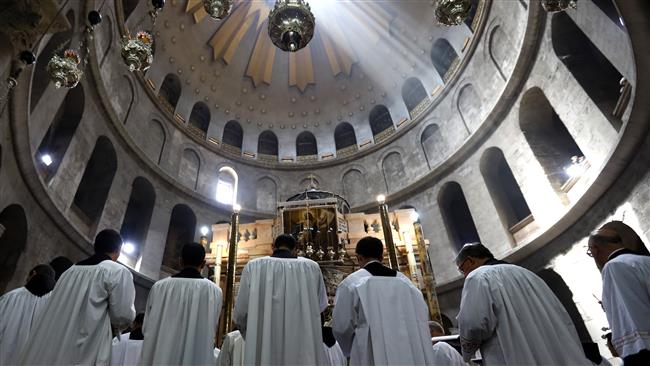
RNA - In a joint statement released on Monday, the heads of the Catholic, Ethiopian, Greek Catholic, Greek Orthodox, Lutheran, Syrian and other churches condemned a recent Israeli court ruling, which allows the sale of two hotels to an Israeli pro-settlement organization near Jaffa Gate in Jerusalem al-Quds’ Old City.
Last month, the Jerusalem District Court upheld a set of real estate deals struck in 2004 between officials from the Greek Orthodox Church and Ateret Cohanim organization.
Elsewhere in their statement, the Jerusalem al-Quds churches denounced a controversial Israeli bill that would transfer the ownership of church land sold to private investors to the Tel Aviv regime in return for compensation.
“We see in these actions a systematic attempt to undermine the integrity of the Holy City of Jerusalem (al-Quds) and the Holy Land, and to weaken the Christian presence,” the statement read, warning that the Israeli “threats to the Christian community can only increase the troubling tensions that have emerged in these turbulent times.”
“Such attempts to undermine the Christian community of Jerusalem (al-Quds) and the Holy Land do not affect one Church only; they affect us all, and they affect Christians and all people of good will around the world,” it added.
The statement also called for pressure on Israel to block the contentious church land ownership bill and demanded international support “to ensure that no further attempts are made from any quarter to change the [Jerusalem al-Quds’] historical Status Quo and its provisions and spirit.”
“We cannot stress strongly enough the very serious situation that this recent systematic assault on the status quo has had on the integrity of Jerusalem [al-Quds] and on the well-being of the Christian communities of the Holy Land, as well as on the stability of our society,” it said.
Muslim Palestinians have for long complained about Israeli attempts to Judaize Jerusalem al-Quds by transforming the city’s demographic landscape through a variety of methods including settlement construction, demolition of Palestinian homes, denying residency rights and replacing Arab names with Hebrew ones.
Tensions have been particularly high surrounding the al-Aqsa Mosque which is the third holiest site to Muslims.
The latest round of tensions erupted in July following a deadly shootout outside the Haram al-Sharif, which Jews call Temple Mount.
Using the gunfight as a pretext, Israel set up metal detectors and surveillance cameras at the entrances to the al-Aqsa Mosque compound.
The restrictive measures sparked criticism worldwide, with Palestinians saying that the bans were meant to expand the regime’s control over the holy site.
Christian youths and activists also took part in the protests against Israeli measures to restrict Muslims’ access to the holy site.
On July 24, Tel Aviv backed down in the face of protests as well as violent clashes and removed all the restrictions at the al-Aqsa compound.
847/940